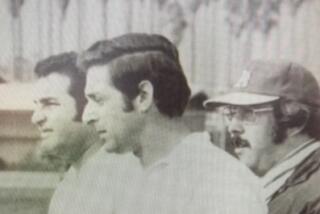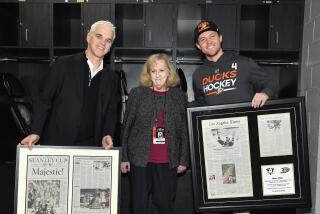Bump Elliott Leaves Legacy Behind at Iowa
- Share via
IOWA CITY, Iowa — Look around the office where Bump Elliott spent his final days as Iowa’s athletic director and you’d never guess who worked there for 21 years -- or what he accomplished.
A wall where pictures once hung was bare. His bookshelves and desk were cleared of the mementos collected over six decades in college athletics. The family photos were gone, too, packed up and taken home.
All that remained were the files Elliott was passing on to his successor.
But if his office was nearly empty, the legacy Elliott leaves behind bulges with accomplishment, a period of unprecedented growth and success at Iowa.
Donations and gate receipts poured in as the Hawkeyes won championships in one sport after another. New facilities were built, older ones were expanded and modernized. Even the football team, once a laughingstock, was rejuvenated and made bowl trips an annual rite.
And while he never diagrammed a play or blew a whistle in practice, Elliott set the tone for the era of success.
Now, at 66, he’s calling it quits. He announced his retirement in February and officially stepped down Thursday.
The athletic department was divided by a bitter dispute when Elliott took the job on June 11, 1970. It’s one big happy family as he leaves.
“There is a good feeling within the department. At least, that’s the way I feel about it,” Elliott said. “And if that’s a footprint or anything I’ve left, then maybe I’ve made a mark. It would be nice to think the people in the department enjoy being here.”
They do.
“It’s going to be different without him,” basketball coach Tom Davis said. “We all feel the same way. But it’s a good move for him. He looks great and he feels great.”
Elliott first made his mark in college athletics as a running back at Michigan from 1946-48. He was an assistant football coach at Oregon State, Iowa and Michigan and head coach at Michigan for 10 years, going 51-42-2. He quit coaching in 1968 to become associate AD at Michigan. After 18 months in that job, he went to Iowa.
Elliott has much to savor in his retirement, which he’ll spend at his Iowa City home a few blocks from the office he occupied in Carver-Hawkeye Arena.
During Elliott’s tenure, Iowa teams won 12 NCAA and 29 Big Ten Conference championships. Carver-Hawkeye Arena was built, Kinnick Stadium was renovated and expanded to more than 70,000 seats, an indoor practice facility for football and others sports was put up, the Hawkeyes’ baseball field was built and an all-weather track and field complex was constructed.
Sellouts were routine at football and basketball games and fund raising took off. In 1976, Iowa fans and alumni contributed $455,000 to the athletic department. Last year, those donations hit $4.8 million from more than 13,000 contributors.
Elliott is clearly proud of what has transpired. But he’s not the kind to brag. Never was, never will be.
“The most pleasing thing to me would be if we have put together a program that has some tradition to it and has consistency to it,” Elliott said. “Where coming to Iowa as a coach or as an administrator is not a stepping stone. It’s a job or a position that people would like to say is a plum.
“To be competitive, to be hopefully like a Michigan or a Penn State or an Ohio State, Notre Dame, Southern California, Texas -- that have good programs year after year -- that would be something I would feel very good about.”
And he’d like nothing more than to see the Hawkeyes continue winning under his successor, Bob Bowlsby.
“The best thing that could happen is to have the program not only succeed next year and in the future, but even improve,” Elliott said.
Perhaps the most critical decision an athletic director makes is hiring a coach. In that area, Elliott excelled. Davis, Hayden Fry, Lute Olson, Dan Gable, Glenn Patton -- all were hired by Elliott and all built powerhouse teams.
Elliott said there’s no formula for hiring the right person. Much of it is instinct and gut feeling.
“You assume that a person you’d like to visit with and get to know as a candidate has the ability as a coach, has the knowledge, has the skill and the background to be a good coach,” Elliott said.
Of all the hiring decisions Elliott made, perhaps the most critical came in December 1978. That’s when he brought Fry on board as football coach. Fry had made his name in the Southwest Conference at SMU in the 1960s but had been fired from that job and was coaching at little-known North Texas State when Elliot brought him to Iowa City.
Iowa had endured 17 straight non-winning seasons in football, a string that continued in Fry’s first two years. But in 1981, Fry guided Iowa to a share of the Big Ten Conference title and its first Rose Bowl appearance in 23 years. There have been eight more bowl trips and only one losing season since.
“The background was there, he had the experience in big-time coaching, the success in big-time coaching and yet was frustrated in where he was, that he couldn’t realize the fruits of some of that. As a result, you could tell he had ambition and desire and all the tools to make it go,” Elliott said.
There also were dark moments.
The most troublesome came in the late 1980s, after it was revealed that former Iowa football players Ronnie Harmon and Devon Mitchell had accepted money from agents while still in school.
Even more shocking was the disclosure of Harmon and Mitchell’s academic records during the trial of agents Norby Walters and Lloyd Bloom. Although they were technically eligible, the players’ transcripts were dotted with courses such as bowling, billiards and watercolor painting.
“In my opinion, the whole story of the academic program at Iowa, and even of Harmon and Mitchell, was not told,” Elliott said. “There were so many things left unsaid in that because it would be unheard of for us to play a student-athlete knowing he was ineligible. That’s just unheard of.”
Elliott has been carrying out his duties faithfully to the end. He spent his last official day on the job at the Big Ten football kickoff meetings in Chicago.
More to Read
Go beyond the scoreboard
Get the latest on L.A.'s teams in the daily Sports Report newsletter.
You may occasionally receive promotional content from the Los Angeles Times.










